
The white-shouldered tanager is a medium-sized passerine bird. This tanager is a resident breeder from Honduras to Panama, South America south to Ecuador and southern Brazil, and on Trinidad.

The ochre-breasted tanager is a species of bird in the family Cardinalidae. It is found in Colombia and Ecuador where its natural habitats are subtropical or tropical moist lowland forests and subtropical or tropical moist montane forests. As a fairly common species with a stable population, the International Union for Conservation of Nature has rated this bird as being of "least concern".

The red pileated finch, also known as the red-crested finch, is a species of bird in the family Thraupidae. It is found in Argentina, Bolivia, Brazil, Ecuador, French Guiana, Guyana, Paraguay, Peru, on the eastern side of the Andes. Its natural habitats are subtropical or tropical dry forests, subtropical or tropical moist lowland forests, subtropical or tropical dry shrubland, and heavily degraded former forest. This is a common species, and the International Union for Conservation of Nature has rated its conservation status as "least concern".
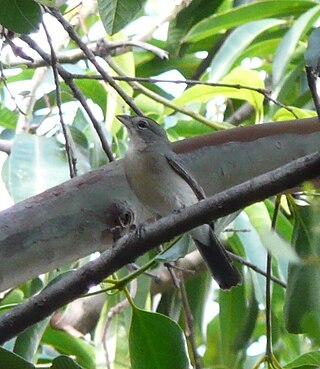
The grey pileated finch, also known as the pileated finch, is a species of bird in the family Thraupidae, where it has recently been moved to from the Emberizidae. It is found in Brazil, Colombia, French Guiana, and Venezuela in subtropical or tropical dry forests, subtropical or tropical moist lowland forests, subtropical or tropical dry shrubland, and heavily degraded former forest.

The yellow-backed tanager is a species of bird in the family Thraupidae, the tanagers. It is found in Bolivia, Brazil, Colombia, Ecuador, French Guiana, Guyana, Peru, Suriname; also extreme eastern Panama in Central America. Its natural habitats are subtropical or tropical moist lowland forest and heavily degraded former forest.

The white-winged shrike-tanager is a species of bird in the family Thraupidae. It is found in Bolivia, Brazil, and Peru in subtropical or tropical moist lowland forests. Two subspecies are recognised, L. v. versicolor from eastern Peru, western Brazil and northern Bolivia, and L. v. parvus from eastern and central Brazil and northeastern Bolivia.

The golden-crowned spadebill is a species of bird in the family Tyrannidae. It is found in Bolivia, Brazil, Colombia, Costa Rica, Ecuador, French Guiana, Guyana, Honduras, Nicaragua, Panama, Peru, Suriname, and Venezuela. Its natural habitat is subtropical or tropical moist lowland forests.

The masked crimson tanager is a species of bird in the family Thraupidae. It is found in Bolivia, Brazil, Colombia, Ecuador, and Peru. Its natural habitats are subtropical or tropical swamps and subtropical or tropical moist shrubland.
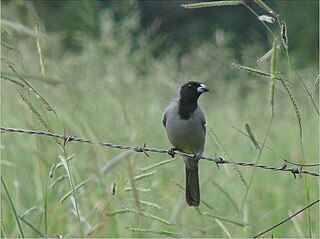
The black-faced tanager is a species of bird in the family Thraupidae.

The flame-crested tanager is a species of bird in the family Thraupidae. It is found in Bolivia, Brazil, Colombia, Ecuador, French Guiana, Guyana, Peru, Suriname, and Venezuela. Its natural habitats are subtropical or tropical moist lowland forests and subtropical or tropical dry shrubland. Ten subspecies are currently recognized.
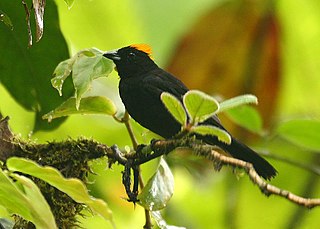
The tawny-crested tanager is a species of bird in the family Thraupidae. It is found in Colombia, Costa Rica, Ecuador, Honduras, Nicaragua, and Panama. Its natural habitats are subtropical or tropical moist lowland forests, subtropical or tropical moist montane forests, and heavily degraded former forest.
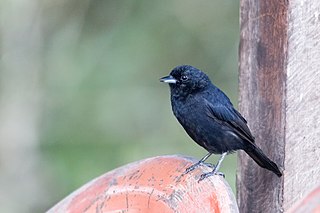
The red-shouldered tanager is a species of bird in the family Thraupidae.

The yellow-crested tanager is a species of bird in the family Thraupidae. It is found in the western Amazon Basin . Its natural habitat is subtropical or tropical moist lowland forests.

The fulvous-crested tanager is a species of bird in the family Thraupidae, the tanagers.
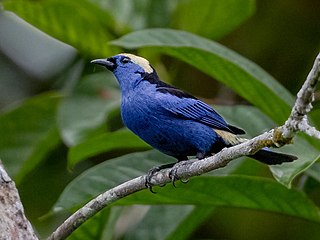
The opal-crowned tanager is a species of bird in the family Thraupidae, the tanagers. It is one of 49 species in the genus Tangara.
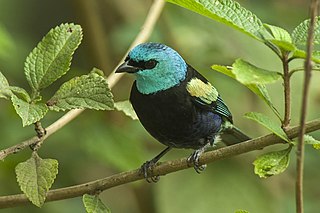
The blue-necked tanager is a species of bird in the family Thraupidae. It is found in South America from Colombia to Bolivia.

The black-capped tanager is one of the many species of Neotropical bird in the family Thraupidae. It lives in mountains of Ecuador, Colombia and Venezuela year-round. This bird can often be found in open landscapes, alone or in pairs, hiding under branches of trees and bushes. Its natural habitats are subtropical or tropical moist montane forests and heavily degraded former forest.
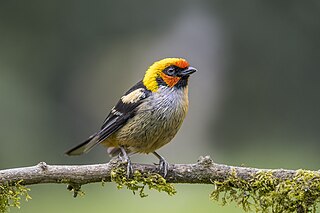
The flame-faced tanager is a species of bird in the tanager family Thraupidae. It is endemic to South America and is found in the eastern Andes of Colombia, Ecuador, Peru and Venezuela. Its natural habitat is subtropical or tropical moist montane forests. It is a distinctive-looking species with black and opalescent green upperparts, opalescent green and buff underparts, and a deep red and yellow face. The subspecies lunigera lacks the deep red on the face, which is replaced with orangish-red.

The blue-and-yellow tanager is a species of bird in the tanager family Thraupidae.

The sooty grassquit is a small bird. It is recognized as a tanager closely related to Darwins finches.























